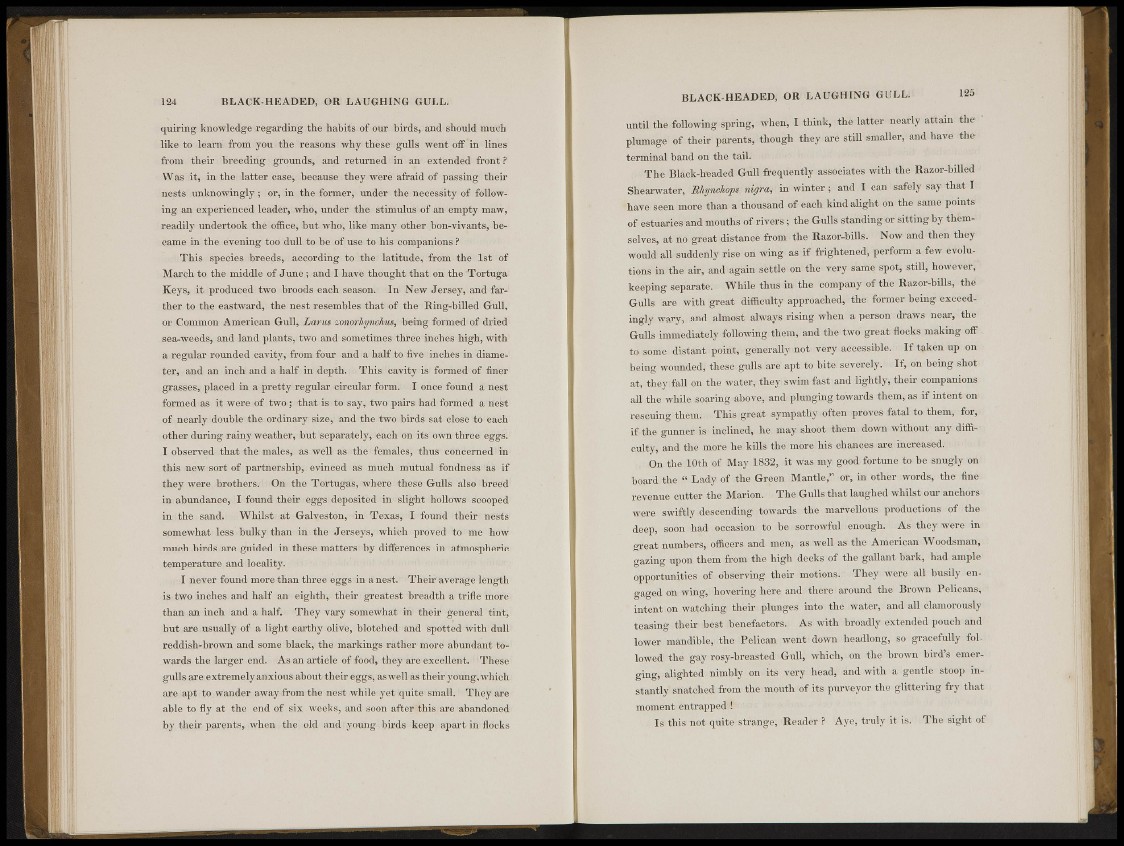
124 BLACK-HEADED, OR I.At'GlIING «II,L.
quiring knowledge regarding the habits of our birds, and should much
like to learn from you the reasons why thèse ¡gulls went off in lines'
from their breeding grounds, ami returned in an extended front?'
Was it,-, in the latter case, because they were afraid of passing their
nests unknowingly ; or, in the former, under the necessity of following
an experienced leader, who, under the stimulus- of an empty maw,!
readily undertook the office, but,who, like many other bon-vivants, became
in the evening too dull to be of use to his companions r
This species breeds^ "according to "oho* latitude, from the 1st of
March to the middle of June ; and I have thought that on the 'Tortuga
Keys,: it produced two broods each season. In New Jersey, and farther
to thé eastward, thé nest resembles thati>©f 4h'e Ring-billed Gull,
or Common American Gull, Larva somrhynckus, being formed of dried
sea-weeds, and land plants, two and sometimes three inches high, with
a regular rounded cavity, from four and a half to five inches in diameter,
and- an inch and a half in depth. This cavity is formed of finer
grasses, placed in a pretty regular circular form. I once found a nest
formed as it were of two ; that is to say, two pairs had formed a nest
of nearly doublet the ordinary size, and the two birds: sat close to each
other during rainy weather, but separately, each on its own three eggsî'
I observed- that the males, as well as the females; thus concernedE&ti'
this new sort of partnership, evinced as much mutual1 fondnëss1 as if
they were brothers.1 ' On the Tortugas, wheMiîthose Gulls also breed
in abundance, I found their eggs deposited in slight hollows scooped
in the sand. Whilst at Galveston, in Texas, I found their- ii«sts
somewhat leiss bulky than in the Jerseys, which proved to me how
. much birds are guided in these, matters! by differences i n atmospherictemperature
and locality.
I never found more than three eggs in a nest. ' Their average length
is-two inches and half an eighth, their greatest breadth a trifle more
than an inch and a half. - They vary somewhat their general tint,
hut axe usually of a light earthy olive, blotched and spotted with dull
reddish-brown and some black, the markings rather more abundant towards
the larger end. As an article of fitod1, they are1 excellent.; 'These
gulls are extremely anxious about their eggs, as WélliâS their young, which
are apt to wander away from the mègt while yet ¡quite > small; ' They are
able to fly at the end of six weeks, and soon a.fterthis are abandoned
by their parents, when the old and young' birds keep apart in flocks
BLACK-HEADED; OR LAUGHING GULL. 125
until the following spring, when, I think, the latter nearly attain the "
plumage of their parents, though tl,cy are still «miller, and have the
terminal band on the tail.
The Black-hraded Gull frequently associates with the Razor-billed
Shearwater, Mynchops nigra, in winter; and I can safely say that 1
have seen more than a thousand of each kind alight on the same points
of estuaries and mouths of rivers; the Gulls standing or sitting by themselves,
at no great distance from . the Razor-bills. Now and then they
would all suddenly rise'on wing as if frightened, perform-a,few evolutions
in the air, and again settle on the very same spot, still, however,
keeping separate. While thuiakithe company of the Razor-bills, the
Gulls are With great difficulty approached, the former being exceedingly
wary, and almost always rising when a person" draws near, the
Gulls immediately Ibllowmgnhem, ant the two greatsftjeks making off
to,«some distant point,••'giinonilh not very accessible. If taken up on
being wounded, these/gulls arc apt to bite .severely. If, on being shot
at, they fall i«i the water,: they, swim last, and lightly, their companions
all the while soaring above, and plunging towards them, as if intent on
rescuing»thttn#.-This great sympathy often proves- fatal to them, for,
if the gunner is inclined, he may shoot them down without any difficulty
and the more ho kills the more his chances-are increased.
On the .lOth of May 1832, it was mv good fortune to be snugly on
board the " Lady of the Green Mantle," or, in other words, the fine
revenue cutter «he .Marion. !, The Gulls that laughed whilst our anchors
were swiftly descending towards the marvellous productions of the
deep, soon had occasion to be sorrowful ¡enough. As they were in
great numbers, officers and men, as well as the American Woodsman,
gazing upon them from-the high docks of the gallant bark, had ample
opportunities of observing their motions. They were all busily engaged
oincwing, hovering here, and thire 'around the Brown Pelieans,
intent on watching, their plunges into the water, and all clamorously
teasing . their -best benefactors. As with broadly extended pouch and
lower mandible, the Pelican went down headlong, so gracefully followed;
the :gafi »sy-breasted Gull, which, :»n the brown bird's emerging^
alighted nimbly on its very head, and with a gentle stoop instantly
snatched- from the.mouth of its purveyor the glittering fry that
moment entrapped !
Is this not quite strange, Reader? Aye, truly it is. The sight of